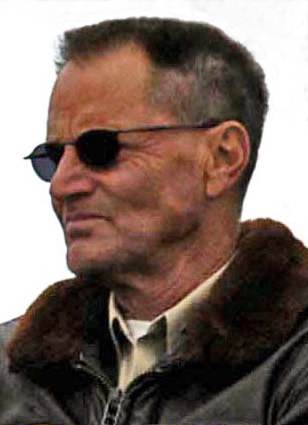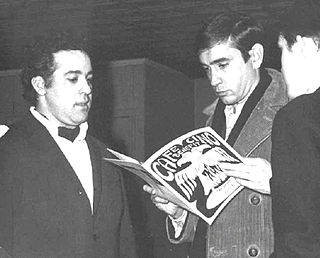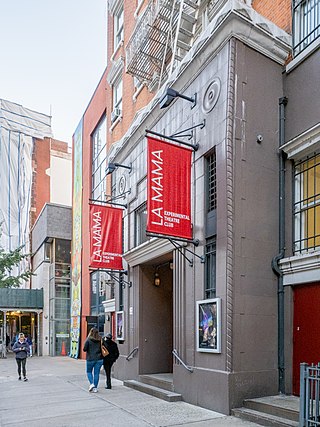
Samuel Shepard Rogers III was an American actor, playwright, author, director and screenwriter whose career spanned half a century. He won 10 Obie Awards for writing and directing, the most by any writer or director. He wrote 58 plays as well as several books of short stories, essays, and memoirs. Shepard received the Pulitzer Prize for Drama in 1979 for his play Buried Child and was nominated for an Academy Award for Best Supporting Actor for his portrayal of pilot Chuck Yeager in the 1983 film The Right Stuff. He received the PEN/Laura Pels Theater Award as a master American dramatist in 2009. New York magazine described Shepard as "the greatest American playwright of his generation."
The Open Theater was an experimental theatre group in New York City, active from 1963 to 1973.

Joseph Chaikin was an American theatre director, actor, playwright, and pedagogue.
Richard Schechner is University Professor Emeritus at the Tisch School of the Arts, New York University, and editor of TDR: The Drama Review.
Jacques Levy was an American songwriter, theatre director and clinical psychologist.
Michael Kahn is an American theater director and drama educator. He was the artistic director of the Shakespeare Theatre Company in Washington, D.C. from 1986 until his retirement in 2019. He held the position of Richard Rodgers Director of the Drama Division of the Juilliard School from 1992 to 2006.

Joseph Cino, was an Italian-American theatre producer. The Off-Off-Broadway theatre movement is generally credited to have begun at Cino's Caffe Cino in the West Village of Manhattan.

William M. Hoffman was an American playwright, theatre director, editor, and professor.

Tom Eyen was an American playwright, lyricist, television writer and director. He received a Tony Award for Best Book of a Musical for Dreamgirls in 1981.

La MaMa Experimental Theatre Club is an Off-Off-Broadway theater founded in 1961 by African-American theatre director, producer, and fashion designer Ellen Stewart. Located in the East Village neighborhood of Manhattan in New York City, the theater began in the basement boutique where Stewart sold her fashion designs. Stewart turned the space into a theater at night, focusing on the work of young playwrights.
Michael Townsend Smith is an American playwright, theatre director, impresario, critic, and lighting designer.
Marguerite Duffy, known professionally as Megan Terry, was an American playwright, screenwriter, and theatre artist.
The Committee was a San Francisco-based improvisational comedy group founded by Alan Myerson and Jessica Myerson. The Myersons were both alums of The Second City in Chicago. The Committee opened April 10, 1963 at 622 Broadway in a 300-seat Cabaret theater that used to be an indoor bocce ball court in San Francisco's North Beach.
Conard Fowkes was an American actor. He was best known for acting in soap operas, including Kitty Foyle, Dark Shadows, The Edge of Night, The Secret Storm, Hidden Faces, Search for Tomorrow, A Flame in the Wind, and As the World Turns.
Ann Dunnigan Kennard was an American actress and teacher who later became a translator of 19th-century Russian literature.

Paul Roose-Evans Foster was an American playwright, theater director, and producer born in Penns Grove, New Jersey. He was a founding member and the first president of La MaMa Experimental Theatre Club.
Jean-Claude van Itallie was a Belgian-born American playwright, performer, and theatre workshop teacher. He is best known for his 1966 anti-Vietnam War play America Hurrah;The Serpent, an ensemble play he wrote with Joseph Chaikin's Open Theatre; his theatrical adaptation of the Tibetan Book of the Dead; and his translations of Anton Chekhov's plays.

Viet Rock is a rock musical by Megan Terry that served as inspiration to the musical Hair. A violent denunciation of the American involvement in the Vietnam War, the play was described by its author as a "folk war movie" comprising scenes of disillusionment and protest to the American military presence in Southeast Asia. Viet Rock is widely considered to be the first rock musical written and performed in the United States, as well as the first protest play about Vietnam. Its premiere also marks the first major theatre production in the United States in which actors left the stage to interact directly with the audience.
Marianne de Pury is a Swiss theatre artist and composer born in St. Gallen, Switzerland. She is best known as the musical composer of two 1966 anti-war plays, Jean-Claude van Itallie's social satire America Hurrah and Megan Terry's rock musical Viet Rock.

The Firehouse Theater of Minneapolis and later of San Francisco was a significant producer of experimental, theater of the absurd, and avant guard theater in the 1960s and 1970s. Its productions included new plays and world premieres, often presented with radical or inventive directorial styles. The Firehouse introduced playwrights and new plays to Minneapolis and San Francisco. It premiered plays by Megan Terry, Sam Shepard, Jean-Claude van Itallie, María Irene Fornés and others; and it presented plays by Harold Pinter, John Arden, August Strindberg, John Osborne, Arthur Kopit, Eugène Ionesco, Berthold Brecht, Samuel Beckett and others. In a 1987 interview Martha Boesing, the artistic director of another Minneapolis theatre, described the Firehouse Theater as "the most extreme of all the groups creating experimental theater in the sixties, and the closest to Artaud’s vision." Writing in 1968, The New York Times said that the Firehouse Theater "has been doing avantgarde plays in Minneapolis nearly as long as the Tyrone Guthrie Theater has been doing the other kind, and with much less help from the Establishment." That same year, when a federal grant was provided to support the Firehouse, it was pointed out in the Congressional Record that the Firehouse Theatre "is the only major theatre dealing experimentally with the writing of plays and their production outside the metropolitan New York area."







